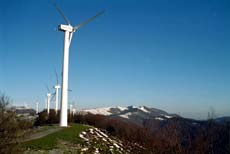European Programme to promote renewable energy

The European Commission has accepted EVE, the Basque Energy Entity, and Eolicas de Euskadi within the programme to promote renewable energy. The European Union is aware of the effort EVE is doing to obtain 12 % of primary energy from renewable energy. This entity has been accepted in the programme Campaign for Take-Off, together with Eolicas de Euskadi. The programme has been designed by the European Commission and as the first step they want to create a Renewable Energy Partnership. This partnership would group companies, public and private organisations that commit themselves in the development of renewable energy of the nature.
EVE has been included, particularly, through the programme “Photovoltaic solar installations connected to the electrical network in schools of the Basque Country”. This programme has been created with the collaboration of EVE, Department of Education, Universities and Research of the Basque Government. The aim of this initiative is to raise public awareness in relation to the advantages of renewable energy. Similarly, and as a consequence of this initiative, before the end of this year the Basque Autonomous Region will duplicate the number of photovoltaic installations.
The agreement, a pioneer at national level, between 2002-2005 will set 170 new photovoltaic solar installations in many other schools of Araba, Bizkaia and Gipuzkoa. Each installation will have a power of 5kW. According to that, and taking into account that by the end of the year 2002 50 new installations will be established, the actual power will be duplicated. As for the information provided by EVE, on 31st December 2001, 227 kW were produced with photovoltaic installations.
The company Eolicas de Euskadi has been accepted after the presentation of the work “Plan for Promoting and Developing Eolian Energy in the Basque Country”. This plan explains how to make the maximum use of energy of less environmental impact. It suggests important socio-economic advantages: using native renewable resources, increasing of self-sufficiency rate of energy and promoting use of clean energy, and that way, polluting emissions to the air will be reduced.
The Basque Autonomous region is one of the countries that produces the less eolian energy. The generation of 27 MW eolian power places this region in the tenth position. However, in the next years, a significant increase of this kind of energy is expected in the Basque Autonomous Region.
Media Contact
More Information:
http://www.eve.esAll latest news from the category: Power and Electrical Engineering
This topic covers issues related to energy generation, conversion, transportation and consumption and how the industry is addressing the challenge of energy efficiency in general.
innovations-report provides in-depth and informative reports and articles on subjects ranging from wind energy, fuel cell technology, solar energy, geothermal energy, petroleum, gas, nuclear engineering, alternative energy and energy efficiency to fusion, hydrogen and superconductor technologies.
Newest articles

A universal framework for spatial biology
SpatialData is a freely accessible tool to unify and integrate data from different omics technologies accounting for spatial information, which can provide holistic insights into health and disease. Biological processes…

How complex biological processes arise
A $20 million grant from the U.S. National Science Foundation (NSF) will support the establishment and operation of the National Synthesis Center for Emergence in the Molecular and Cellular Sciences (NCEMS) at…

Airborne single-photon lidar system achieves high-resolution 3D imaging
Compact, low-power system opens doors for photon-efficient drone and satellite-based environmental monitoring and mapping. Researchers have developed a compact and lightweight single-photon airborne lidar system that can acquire high-resolution 3D…





















